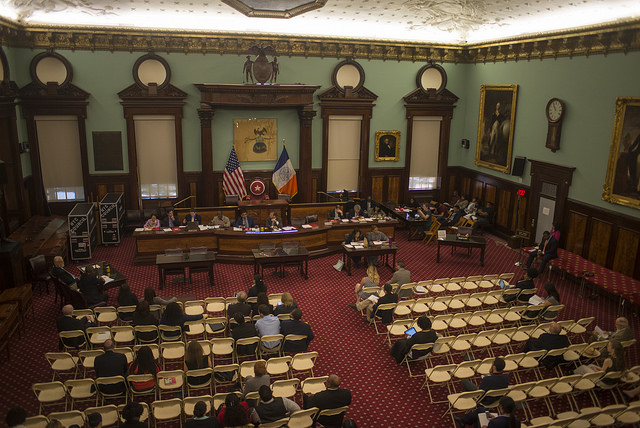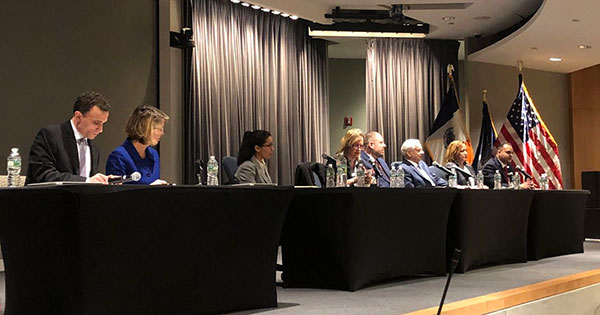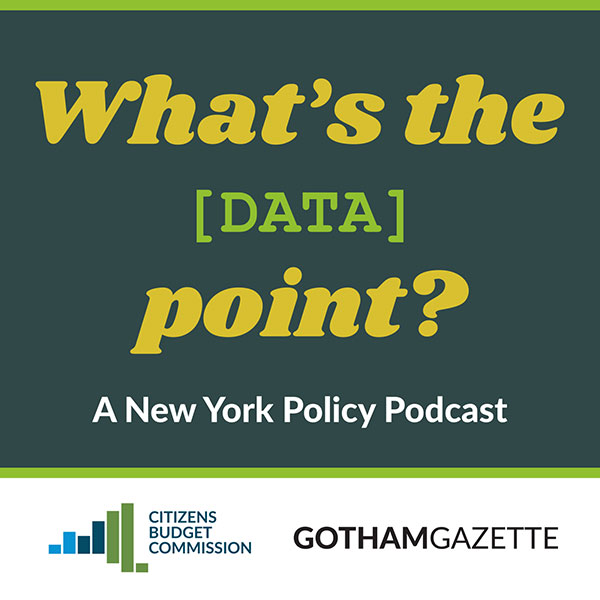Charter Revision Commission Hears Expert Testimony on Conflicts of Interest and Chief Diversity Officer

(photo: Sofie Hecht/Gotham Gazette)
On Thursday evening, the 2019 Charter Revision Commission heard from experts in city government and activist circles to discuss possible charter amendments that could enhance precautionary measures against conflicts of interest in city government, and the potential mandated addition of a chief diversity officer in the mayor’s office, at mayoral agencies, and elsewhere. The push for adding chief diversity officers is being led by city Comptroller Scott Stringer, who created such a position in his office and has made the effort one of his top priorities among many suggested charter changes.
After having held a series of open public hearings around the city, the 2019 Charter Revision Commission announced its focus areas and is holding a series of “expert” hearings as it considers major potential overhauls to the city charter for the first time in 30 years. The commission will submit revisions to the city’s foundational laws before voters this November, though the proposals will undergo several rounds of public input before reaching the ballot.
The commission has already heard from experts on election reform, police accountability, and city budgeting and contracting. The commissioners on the charter revision commission were appointed by a variety of elected leaders, including the mayor, who had the most appointments but not a majority, the comptroller, the public advocate, the City Council speaker, and each of the borough presidents.
The charter currently aims to stamp out corruption in part through the Conflict of Interest Board (COIB), which consists of five mayoral appointees approved by City Council and a staff that executes trainings and investigations, among other tasks.
The COIB currently has four primary goals: educating public servants about the city’s rules on conflicts of interest as delineated in Chapter 68 of the charter, offering advice regarding public servants’ interpretation of Chapter 68 and the Lobbyist Gift Law, prosecuting politicians who break these rules, and enforcing the Annual Disclosure Law that requires yearly financial disclosures from all city politicians. The COIB oversees the mandate of a one-year freeze on politicians’ ability to lobby their former agency once they leave office.
Current COIB Chair Richard Briffault was the only expert on conflicts of interest and corruption to speak before the commission. He did not propose any amendments to the charter, but fielded questions from the commissioners and explained why he believes the COIB is working well in its current form.
“Our small size facilitates deliberation and action. The combination of mayoral appointment and Council confirmation...assures that any issues about any nomination can be publicly aired,” he explained.
Charter Commissioner Sal Albanese -- a former City Council member and three-time mayoral candidate, including in the 2017 Democratic primary against Mayor Bill de Blasio, who was appointed to the commission by Brooklyn Borough President Eric Adams -- asked if serving under mayoral appointment poses an inherent conflict of interest, implying that the current COIB structure incentivizes protection of the mayor. Briffault said he understood the concern, but explained that diversifying appointment power could enhance the notion that a COIB member should serve the politician who appointed them. A standard of mayoral appointees, Briffault argued, promotes a sense of cohesion within the body.
Briffault also cautioned against changing the COIB to operate more like the Joint Commission on Public Ethics, the highly-controversial state body that many argue is ineffective, and which draws appointments from the governor and legislative leaders.
Commission Chair Gail Benjamin, appointed by City Council Speaker Corey Johnson, echoed Albanese’s concerns, asking Briffault if the COIB would benefit by drawing members from a wider variety of employment sectors. Briffault conceded that attorneys currently comprise the majority of the COIB, if not its entirety. “The plus side [to that change] is guaranteeing that different perspectives are there,” he said. “But a lot of what we do is interpret and enforce the law.”
Albanese further inquired about the COIB’s opinion regarding the one-year lobbying ban on public servants leaving office, suggesting that a five-year or even lifetime ban would better root out corruption. Briffault declined to take a position on the matter. “We’re not policy-makers,” he said. But he did affirm the current yearlong measure, positing that a longer ban might “discourage high-quality people from going into government.”
While Albanese expressed concern about lobbying power and methods of circumventing the Lobbying Gift Law, Briffault maintained that certain actions like campaign donation bundling cannot be regulated as lobbying.
Commissioner Stephen Fiala asked if Briffault sought to increase the COIB’s relatively small annual budget of $2.5 million. Briffault remained ambivalent, though he said that either consistently re-adjusting the budget for inflation or tying the budget to a percentage of that of City Council would benefit the COIB. In recent years COIB has pushed for more funding during City Council budget hearings, with representatives explaining that it is challenging to perform all of the trainings and other tasks it has given its staffing levels and high turnover based on lower-than-ideal pay.
The commission also heard from experts regarding the installation of a chief diversity officer within the mayor’s office and deputy officers in each city agency to oversee the Women and Minority-Owned Business Enterprise program (MWBE). While all experts and commissioners agreed on the program’s importance, contention arose over whether the chief diversity officer program should be codified into the city charter when an MWBE system has already been legislated into effect with Local Law 12.
Reverend Jacques Andre DeGraff and Wendy Garcia, chief diversity officer for the office of city Comptroller Scott Stringer, both argued in favor of codification, while director of the Mayor’s Office of MWBEs and Dawn Pinnock, executive deputy commissioner of people operations and risk management at the Department of Citywide Administrative Services, argued that Local Law 12 should stand on its own. Andrea Bowen, an transgender and gender-nonconforming rights activist, did not take a clear stance on the issue, but pushed the commission to consider ways to codify increased hiring of trans folks around the city.
The commission was supposed to hear concerns about the sprawling public pension system, but experts from Comptroller Stringer’s office, who oversee the city pension system, were unable to attend, frustrating Albanese who requested time at the start of the session to rail against the absence of Stringer and his staff. “He’s missing in action and so is his staff,” Albanese said. “It’s a politically tough issue, but that’s what you get paid for as an elected official.”
The next charter commission hearing will take place on Monday, March 18, on other issues of governance, including the role of the public advocate.
***
by Savannah Jacobson
@srjacobson1
@GothamGazette
LISTEN: Queens District Attorney Candidate Debate (3/12/19)

3/12 Queens DA debate (photo: @alyssaguilera)
Six of the seven candidates for Queens District Attorney gathered for a debate on Tuesday, March 12 at CUNY Law School in Long Island City, sponsored by a broad range of reform groups that have formed the "Queens for DA Accountability Coalition" and moderated by Gotham Gazette's Ben Max and Fordham Law Professor Zephyr Teachout. This year, Queens will elect its first new District Attorney since 1991. The Democratic primary is June 25. The six participating candidates at Tuesday's forum were Tiffany Cabán, Melinda Katz, Rory Lancman, Gregory Lasak, Betty Lugo, and Jose Nieves. The seventh candidate in the race, Mina Malik, was unable to attend due to illness.
Listen to the full debate via the embedded audio below, or you can find it in the "Max & Murphy" podcast stream from Gotham Gazette wherever you get your podcasts. [Read more about the candidates and the race here: 'We're in a New Era': Inside the Race to Elect the Next Queens District Attorney.]
What's The [Data] Point? 4.7 MPH, Traffic & Transit with Nicole Gelinas

What's The [Data] Point? Episode 67 -- 4.7 MPH, Traffic & Transit with Nicole Gelinas [You can download What's The [Data] Point? wherever you get your podcasts, including on iTunes]
 Nicole Gelinas of the Manhattan Institute is an expert on New York City transit, street use, and traffic. She joined the podcast to discuss her recent report on "decongesting" New York City, MTA improvement, and how to get New York moving again.
Nicole Gelinas of the Manhattan Institute is an expert on New York City transit, street use, and traffic. She joined the podcast to discuss her recent report on "decongesting" New York City, MTA improvement, and how to get New York moving again.
Listen to the conversation and let us know what you think: Ben Max of GG (@TweetBenMax), Maria Doulis of CBC (@MariaDoulis). Listen below or download wherever you get your podcasts!
***
by Ben Max, Gotham Gazette
@tweetBenMax @GothamGazette




